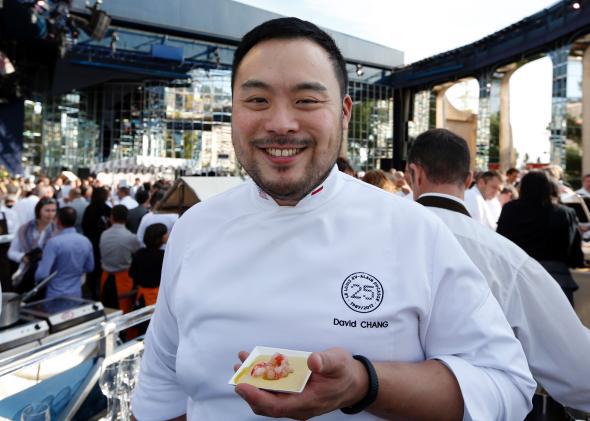This post originally appeared on Inc.
Unless you’re a ramen fanatic or a fairly serious foodie, David Chang’s name still might not register with you. Sure, he had his own PBS TV show for a while—The Mind of a Chef—but it was more of a love letter to his obsessions with noodles and eggs than the sort of mass-market stuff that catapulted Rachael Ray and other Food Network cooks to stardom.
In the business world, Chang, the founder of the Momofuku restaurant group, may be even less well-known. But that may be simply because he seems less comfortable talking about his growing empire than about his aforementioned food obsessions. At least that’s how he appeared Saturday, when he took the stage at Austin’s South by Southwest Interactive conference to talk to Awl editor Matt Buchanan about the future role of tech in food. “We’re just a restaurant company—we don’t know anything about tech,” Chang said. But that’s not entirely true, a point I’ll get to in a moment.
Chang opened his first restaurant, Momofuku Noodle Bar, in New York City’s East Village in 2004. Since then, he’s parlayed his own tastes—“I’m a normavore,” he said, “I like to eat normal shit”—into several different restaurant concepts that now make up 15 locations in New York, Sydney, and Toronto. The latest, which he announced at SXSW, is going to be Fuku, a tiny outpost that will churn out spicy fried chicken sandwiches, and spicy fried chicken sandwiches only, because, he said, “It’s what I want to eat.”
But here’s where Chang’s nonchalance belies his sharp entrepreneurial instincts. Chang hates waiting in lines for food and he suspects a lot of other people do, too. So Fuku is also going to be a testing ground for an app that will let you order your sandwich for delivery. A delivery app alone is not exactly revolutionary, but it shows where Chang is headed.
Later in the interview, he tweaked his earlier comment about his company’s unfamiliarity with technology. “We’re not just a restaurant group,” he said. “There is a lot of crazy shit happening here.”
Momofuku has already created its own reservations software platform, because Chang wasn’t particularly happy with the existing options on the market. He also expressed his frustration with restaurants’ inability to effectively collect data on customers and reward them for their loyalty. And although he doesn’t care for Taco Bell, he’s impressed by the chain’s app that directs customers to the closest place to get a taco fix. “I would love that,” he said.
Will Chang pursue all of those ideas within Momofuku? It’s unclear, but he’s certainly not short on tech ideas for the food industry. A few more he mentioned:
- “Restaurant point-of-sale systems are the worst. All of those iPad apps out there aren’t really fully integrated.”
- “There should be a better way to collect customer details, the small things that enhance the experience.” One example he cited: If you know a particular wine is at its best when you’ve let it breathe for six hours prior, and you know that a particular customer would really enjoy that wine, there should be a technical solution to alert the customer in advance so he can request the bottle and the restaurant can open it at the proper time.
- “It’s only a matter of time before the whole idea of waiting in line [for food] will go away.” But until then, “shouldn’t there be a way of exchanging commerce with those people while they wait?” Chang is taking another step toward that last point with Maple, a venture that will aim to deliver food to people in Manhattan in 15 minutes or less using a smart logistics platform. He’s an investor in Maple and will be its chief culinary officer.
So despite his insistence that he doesn’t know anything about tech, Chang has a strong intuition about how people will use tech and food together, which is arguably more useful.
For all of his willingness to use technology to shake up the restaurant industry with apps and smartphones and data, his most radical idea is also the least flashy—and probably the most difficult to scale. He wants to see the food industry—specifically the cooking part—acquire the same coolness factor the tech industry has for wannabe engineers. But to do that, the pay must go up dramatically.
“I want my cooks to make $20, $30, $40 an hour,” he said. He’s hoping that if Momofuku can pull that off, maybe other restaurants will follow suit. According to the Bureau of Labor statistics, the average line cook makes around $11 an hour.
Chang explained that that’s part of what’s fueling his interest in expanding the Momofuku brand into different ventures and to areas outside the U.S. “We’ve never done growth before. A magazine is not a growth plan,” he said of Lucky Peach, the barely profitable food journal and website he started in 2011. Going forward, he said, “I have to put away my goals and take care of my employees.”
See also: The Company to Call When You’ve Got Millions of Dollars in Cash and Marijuana
